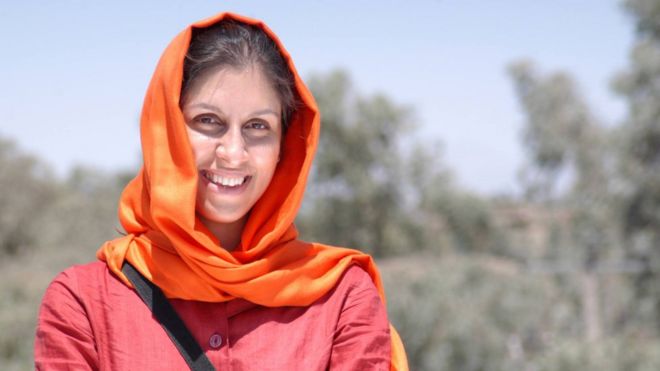The UK foreign secretary will call for the release of the British-Iranian woman, along with other dual nationals.
Mrs Zaghari-Ratcliffe is serving a five-year sentence over allegations of spying, which she denies.

Mr Johnson's first trip to Iran comes amid rising tensions in the Middle East.
As well as the dual national cases, Mr Johnson will discuss British concerns over Iranian involvement in conflicts in the region, especially in Syria and Yemen.
BBC diplomatic correspondent James Robbins said Mr Johnson's trip to Tehran - only the third made by a UK foreign secretary since 2003 - could "hardly be more sensitive".
He added that the foreign secretary had been careful to lower any expectations of imminent release for Mrs Zagahari-Ratcliffe, warning that such cases are very difficult.
Mrs Zaghari-Ratcliffe was arrested in April 2016 when on holiday to introduce her daughter Gabriella to family.
The child has been living with her maternal grandparents in Iran for the last 20 months.
Mr Johnson was accused of risking an additional five years being added to her sentence when he told a parliamentary committee that she had been in Iran to train journalists.
In November, he apologised in the Commons, retracting "any suggestion she was there in a professional capacity".
Mr Johnson then met with her husband, Richard Ratcliffe, to discuss her case, including calls for her to be given diplomatic protection.
There have been concerns about Mrs Zaghari-Ratcliffe's health after lumps in her breasts were discovered, but those were found to be non-cancerous.
Although not mentioning her by name, Mr Johnson said: "I will stress my grave concerns about our dual national consular cases and press for their release where there are humanitarian grounds to do so."
The Foreign Office would not confirm the names or number of other people being held in Iran, saying their families had asked for their cases to be kept out of the public domain.
In his statement, the foreign secretary listed topics he would raise with his Iranian counterpart, Mohammad Javad Zarif, including finding a political solution to the conflict in Yemen and securing "greater humanitarian access to ease the immense suffering there".
He also said he would underline the UK's support for the 2015 nuclear deal - struck between Iran and six world powers - but "make clear" concerns over the country's activity.
Mr Johnson added: "Iran is a significant country in a strategically important, but volatile and unstable, region which matters to the UK's security and prosperity.
"While our relationship with Iran has improved significantly since 2011, it is not straightforward and on many issues we will not agree.
"But I am clear that dialogue is the key to managing our differences and, where possible, making progress on issues that really matter, even under difficult conditions."
[BBC SOURCES]


0 comments:
Post a Comment